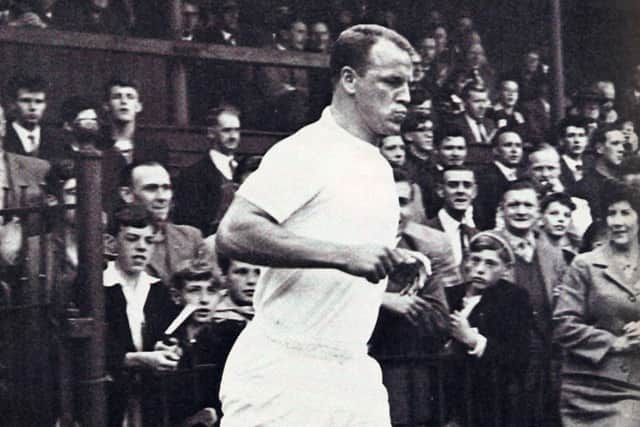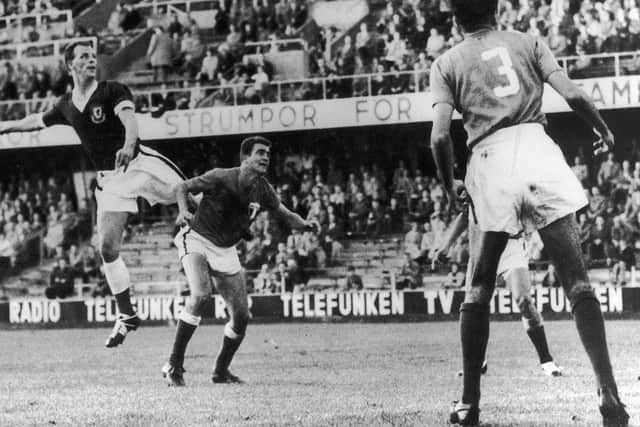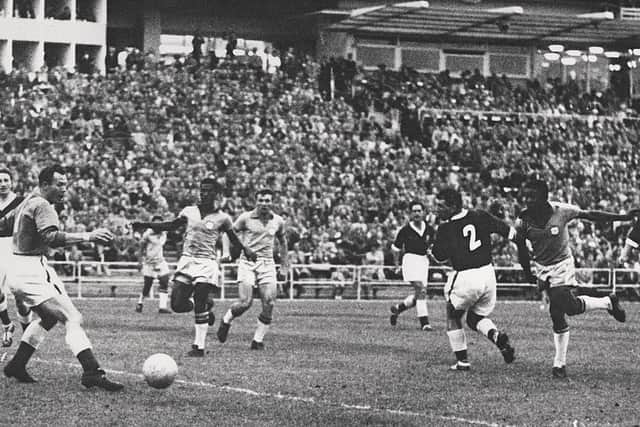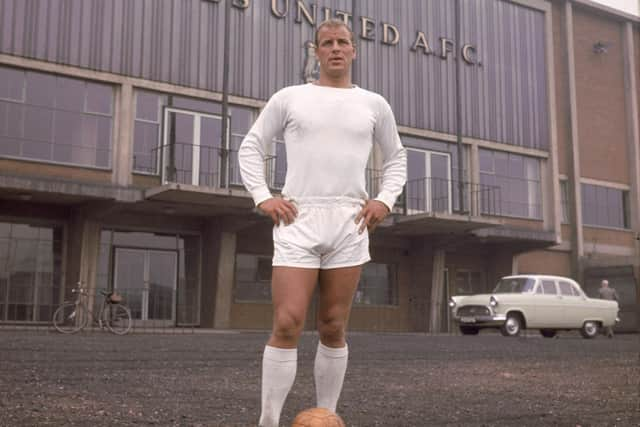How absence of Leeds United's 'Gentle Giant' John Charles helped create the legend of Pele when Wales met Brazil at the 1958 World Cup
Handed his debut aged just 16, the outrageously gifted Pele would have been a superstar whether or not Brazil won their first World Cup in 1958 but it might have had to wait a bit had injury not stopped the late, great John Charles playing against him in Sweden.
It is all ifs, buts and maybes, but such was the hype around Charles's involvement in the sixth edition of the competition, it is no surprise some felt his absence from the quarter-final was decisive.
Advertisement
Hide AdAdvertisement
Hide Ad"(Wales manager) Jimmy Murphy always said to me, 'If Big John had been fit for that match against Brazil we'd have progressed further still'," recalled captain Dave Bowen before his death in 1995.
With players of the quality of Didi, Vava, Garrincha and Pele, Brazil were undoubtedly a better side than Wales in 1958, as they showed by sweeping aside France in the semi-final and Sweden in the final.
Wales, though, were a team of indomitable spirit, a side who should not even have been in Sweden but were determined to make the most of it. Pele's first World Cup goal in his second game, at the age of 17 years and 239 days, was all that separated the teams in Gothenburg on June 19, 1958.
"I felt we could have beaten them on the day – not two or three times, just on that day," reflected Charles, who watched frustrated and helpless from the sidelines.
Advertisement
Hide AdAdvertisement
Hide AdThe tournament had long looked ill-fated for him. Wales missed previous editions with only one home nation qualifying and although that rule had now been dropped, they were due to miss out on football grounds in 1958 until politics intervened.


Israel won their qualifying group by default when Turkey, Indonesia and Sudan refused to play against them. This did not wash with world governing body FIFA, who drew lots from the second-placed teams to decide who would face them in a play-off. Belgium were chosen but when they also refused, Wales got their second chance.
Fatefully, the second leg kept Murphy, who doubled as Manchester United’s assistant manager, away from the European Cup tie in Belgrade which preceded the Munich air disaster and left him planning a World Cup as well as rebuilding a devastated club side.
Whether Charles was going to be available to him was in doubt until the 11th hour.
Advertisement
Hide AdAdvertisement
Hide AdIn 1957 Charles joined Juventus from Leeds United for £65,000. At Elland Road and with Wales he flitted between centre-half and centre-forward but in his debut Serie A campaign he was its 28-goal top-scorer and the champions' player of the season.


When Italy did not qualify for the 1958 World Cup, the decision was taken to extend the season with a summer knockout tournament, and given that money was a big motivation, Juve were very keen for their leading light to play in it.
The rest of the world, it seemed, wanted a player third in that year's Balon d'Or to play on football’s biggest stage but back then FIFA lacked the clout to insist.
Stockholm newspaper Aftonbladet wrote of "the storm of hate that would blow up in Britain if Charles were not allowed to play in the World Cup finals" and chided the Welsh Football Association for not being more forceful in demanding his release, as Sweden had with its Serie A players.
Advertisement
Hide AdAdvertisement
Hide AdA week before the tournament, after Charles pressured the club's president Umberto Agnelli to honour his promise to let him play, the Old Lady finally relented and Charles was allowed to join his Welsh team-mates, who were already in Scandinavia.


"When Big John appeared in Saltsjobaden, Jimmy Murphy came in and said, 'Big John has arrived lads!'" recalled Mel Hopkins. "It was like Jesus Christ appearing for the disciples."
According to full-back Stuart Williams, "He looked magnificent – well bronzed and an immaculately cut lightweight Italian suit."
Or as his brother Mel put it: "He was like a Greek God".
Wales started their campaign against Hungary, the 1954 runners-up and a team which goes down with the Dutch in the 1970s and Brazil in 1982 as one of the greatest never to win the World Cup.
Advertisement
Hide AdAdvertisement
Hide Ad"I seemed to have two Hungarians clinging to me and kicking lumps out of me," recalled Charles in his autobiography King John.
Charles, no stranger to rough treatment after a year in Italy, responded the only way he knew, with a header in off the post to cancel out Jozsef Boszik's opener.


"You could hear the thud as he hit it into the back of the net," said Cliff Jones.
After a 1-1 draw with Mexico, Charles was asked to use his defensive skills to drop into midfield when out of possession – “false nines” are not the modern invention some would have you believe – to secure a 0-0 draw against the hosts. As with two of the other three groups, the quarter-finalists were decided by a play-off.
Advertisement
Hide AdAdvertisement
Hide AdIt meant another, even more bruising, battle with the Mighty Magyars.What is to date Wales’s only World Cup win, 2-1 came at a great cost.
"They kicked the hell out of me, knowing I would not retaliate," wrote Charles. "I could not have done so even if I wanted to because my leg was hurting so badly I couldn't catch anybody. My legs were black and blue from the pummeling they had taken and I began to have doubts about whether I would play against the Brazilians."
That there would no substitutes until the 1970 World Cup added to the risk in playing Charles and being told to go on a team picnic the next day rather rather than get treatment hardly helped.
"Just before kick-off I gave it one last try but it quickly became obvious that I would be a liability" wrote Charles, who called it, "the biggest disappointment of my footballing life. I admit I cried... and cried.”
Advertisement
Hide AdAdvertisement
Hide AdThe seriousness of the injury was shown by the fact it would be two months before he played for Juventus.
Pele's tournament had been no picnic thus far. He thought he might have been selected when his father called to say either his name or that of Tele, the Fluminese player, had been announced on his crackly radio. The teenager had to go and check with his Santos chairman.
Once it began, Pele sat out the opening games against Austria and England with a knee injury but as soon as he was fit, his team-mates press-ganged Vicente Feola into picking him.
Pele made his World Cup debut against USSR at inside-left, the No 10 shirt on his back. It was to be no fairytale, hitting the post and missing two good chances, but two Vava goals put Brazil into the last eight.
Advertisement
Hide AdAdvertisement
Hide AdIt would be a tight quarter-final with Wales, decided 24 minutes from time when Pele took a pass from Didi on his chest with his back to goal, turned centre-half Mel Charles and scuffed a shot past Jack Kelsey with the aid of a deflection off Williams.
"I watched Colin (Webster) miss two early chances and honestly felt that, had I been there instead of him, I might have had one or even both of them," wrote John Charles mournfully.
"On a personal level, I consider the game against Wales my most important of the tournament," commented Pele, who bookended his career by winning the competition again in 1970. "The goal was perhaps the most unforgettable of my career. It boosted my confidence completely. The world now knew about Pele. I was on a roll."
He scored a hat-trick against France in the semi-final and two more against Sweden in the final as Brazil won both 5-2.
Advertisement
Hide AdAdvertisement
Hide AdBy the time Charles returned to Elland Road, for a club record £53,000, his reputation was so big it allowed Leeds to bump up ticket prices for his debut 1962-63 season. “The Gentle Giant” was now a three-time Italian champion and two-time cup winner, having scored over 100 goals in a league notorious for its parsimony.
Charles died 18 years ago but to this day is regarded as one of the greatest players to have graced either shirt, even if his second coming at Leeds only stretched to 11 games (and three goals) before he was sold back to Italy, and Roma.
Pele and Brazil did all right for themselves after 1958 too.
The Stockholm final was the first of five World Cup wins for the Selecao and as their legend grew, so did that of a man widely regarded as one of, if not the, greatest players of all time.
Advertisement
Hide AdAdvertisement
Hide AdFor Wales, the next chapter has been a very long time coming. On Monday, in an air-conditioned stadium in Al Rayyan, they will finally get their next crack at the biggest football tournament of them all.